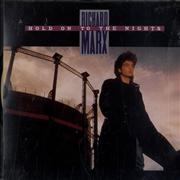| "Hold On to the Nights" | ||||
|---|---|---|---|---|
 | ||||
| Single by Richard Marx | ||||
| from the album Richard Marx | ||||
| B-side | "Lonely Heart" | |||
| Released | May 3, 1988 | |||
| Genre | Pop rock, soft rock [1] | |||
| Length | 5:12 (album version) 4:34 (LP edit) 4:23 (AC edit) | |||
| Label | EMI | |||
| Songwriter | Richard Marx | |||
| Producers | Richard Marx, David Cole | |||
| Richard Marx singles chronology | ||||
| ||||
| Audio sample | ||||
"Hold On to the Nights" is a power ballad written and performed by American rock singer/songwriter/musician Richard Marx. [2] This was the fourth and final single released from his self-titled debut album, and his first to reach number one on the US Billboard Hot 100 chart. The song has been re-released on numerous albums [2] and is included on Marx's live performance DVD A Night Out with Friends (2012). [3]